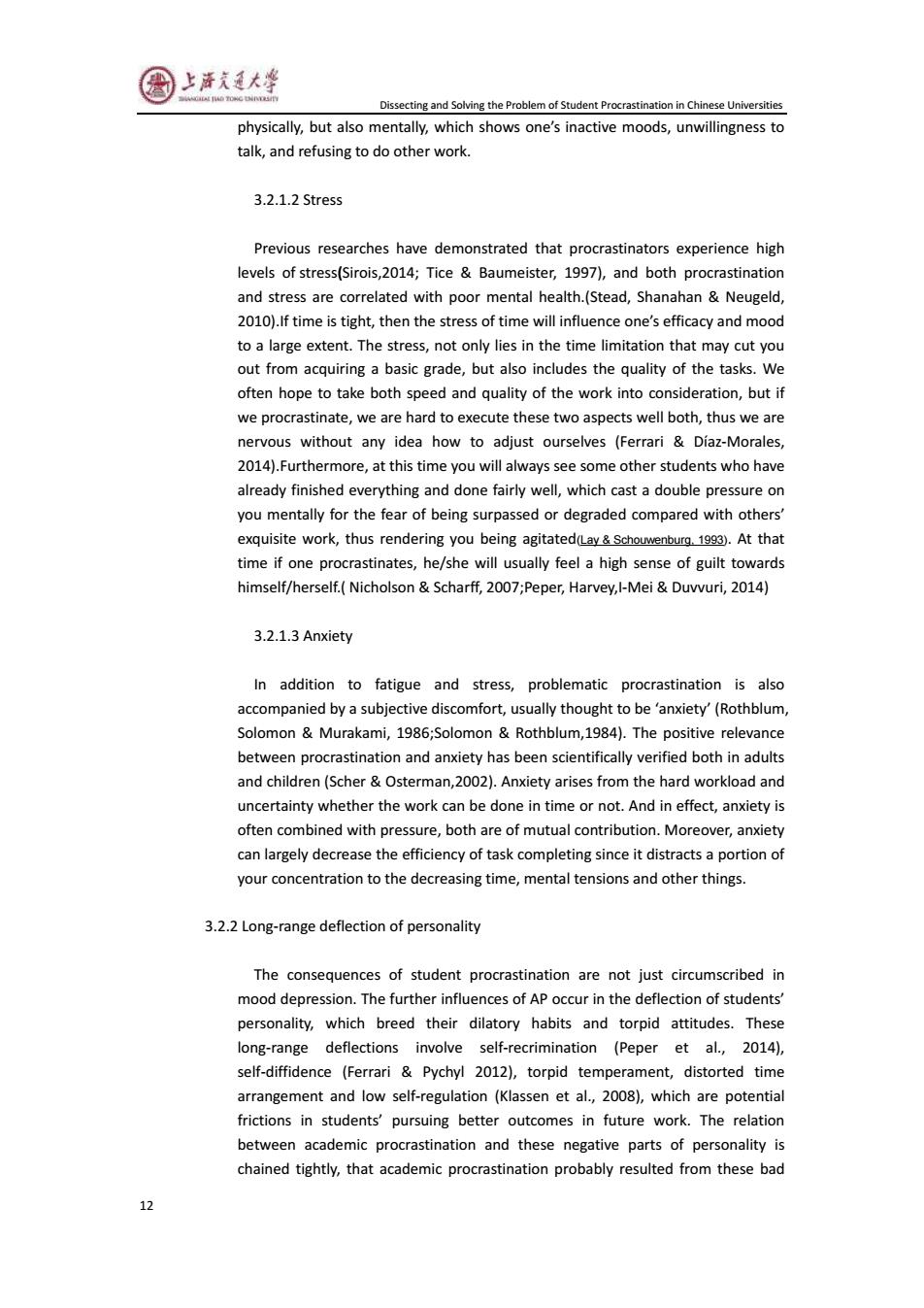正在加载图片...

上泽充是大学 ALAE ILAD TONG ENINERSIT Dissecting and Solving the Problem of Student Procrastination in Chinese Universities physically,but also mentally,which shows one's inactive moods,unwillingness to talk,and refusing to do other work. 3.2.1.2 Stress Previous researches have demonstrated that procrastinators experience high levels of stress(Sirois,2014;Tice Baumeister,1997),and both procrastination and stress are correlated with poor mental health.(Stead,Shanahan Neugeld, 2010).If time is tight,then the stress of time will influence one's efficacy and mood to a large extent.The stress,not only lies in the time limitation that may cut you out from acquiring a basic grade,but also includes the quality of the tasks.We often hope to take both speed and quality of the work into consideration,but if we procrastinate,we are hard to execute these two aspects well both,thus we are nervous without any idea how to adjust ourselves (Ferrari Diaz-Morales, 2014).Furthermore,at this time you will always see some other students who have already finished everything and done fairly well,which cast a double pressure on you mentally for the fear of being surpassed or degraded compared with others' exquisite work,thus rendering you being agitated(Lay Schouwenburg.1993).At that time if one procrastinates,he/she will usually feel a high sense of guilt towards himself/herself.Nicholson Scharff,2007;Peper,Harvey,I-Mei Duvvuri,2014) 3.2.1.3 Anxiety In addition to fatigue and stress,problematic procrastination is also accompanied by a subjective discomfort,usually thought to be 'anxiety'(Rothblum, Solomon Murakami,1986;Solomon Rothblum,1984).The positive relevance between procrastination and anxiety has been scientifically verified both in adults and children(Scher Osterman,2002).Anxiety arises from the hard workload and uncertainty whether the work can be done in time or not.And in effect,anxiety is often combined with pressure,both are of mutual contribution.Moreover,anxiety can largely decrease the efficiency of task completing since it distracts a portion of your concentration to the decreasing time,mental tensions and other things 3.2.2 Long-range deflection of personality The consequences of student procrastination are not just circumscribed in mood depression.The further influences of AP occur in the deflection of students' personality,which breed their dilatory habits and torpid attitudes.These long-range deflections involve self-recrimination (Peper et al.,2014), self-diffidence (Ferrari Pychyl 2012),torpid temperament,distorted time arrangement and low self-regulation (Klassen et al.,2008),which are potential frictions in students'pursuing better outcomes in future work.The relation between academic procrastination and these negative parts of personality is chained tightly,that academic procrastination probably resulted from these bad 12Dissecting and Solving the Problem of Student Procrastination in Chinese Universities 12 physically, but also mentally, which shows one’s inactive moods, unwillingness to talk, and refusing to do other work. 3.2.1.2 Stress Previous researches have demonstrated that procrastinators experience high levels of stress(Sirois,2014; Tice & Baumeister, 1997), and both procrastination and stress are correlated with poor mental health.(Stead, Shanahan & Neugeld, 2010).If time is tight, then the stress of time will influence one’s efficacy and mood to a large extent. The stress, not only lies in the time limitation that may cut you out from acquiring a basic grade, but also includes the quality of the tasks. We often hope to take both speed and quality of the work into consideration, but if we procrastinate, we are hard to execute these two aspects well both, thus we are nervous without any idea how to adjust ourselves (Ferrari & Díaz-Morales, 2014).Furthermore, at this time you will always see some other students who have already finished everything and done fairly well, which cast a double pressure on you mentally for the fear of being surpassed or degraded compared with others’ exquisite work, thus rendering you being agitated(Lay & Schouwenburg, 1993). At that time if one procrastinates, he/she will usually feel a high sense of guilt towards himself/herself.( Nicholson & Scharff, 2007;Peper, Harvey,I-Mei & Duvvuri, 2014) 3.2.1.3 Anxiety In addition to fatigue and stress, problematic procrastination is also accompanied by a subjective discomfort, usually thought to be ‘anxiety’ (Rothblum, Solomon & Murakami, 1986;Solomon & Rothblum,1984). The positive relevance between procrastination and anxiety has been scientifically verified both in adults and children (Scher & Osterman,2002). Anxiety arises from the hard workload and uncertainty whether the work can be done in time or not. And in effect, anxiety is often combined with pressure, both are of mutual contribution. Moreover, anxiety can largely decrease the efficiency of task completing since it distracts a portion of your concentration to the decreasing time, mental tensions and other things. 3.2.2 Long-range deflection of personality The consequences of student procrastination are not just circumscribed in mood depression. The further influences of AP occur in the deflection of students’ personality, which breed their dilatory habits and torpid attitudes. These long-range deflections involve self-recrimination (Peper et al., 2014), self-diffidence (Ferrari & Pychyl 2012), torpid temperament, distorted time arrangement and low self-regulation (Klassen et al., 2008), which are potential frictions in students’ pursuing better outcomes in future work. The relation between academic procrastination and these negative parts of personality is chained tightly, that academic procrastination probably resulted from these bad